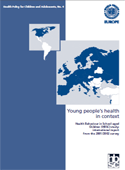Young people’s health in context. Health Behaviour in School-aged Children (HBSC) study: international report from the 2001/2002 survey

Download
Edited by Candace Currie, Chris Roberts, Antony Morgan, Rebecca Smith, Wolfgang Settertobulte, Oddrun Samdal & Vivian Barnekow Rasmussen
Health Policy for Children and Adolescents, No. 4
2004, xiv + 237 pages
ISBN 92 890 1372 9
CHF 60.00
Order no. 1340050
Young people make up the segment of society that has the greatest potential to benefit from policies and health initiatives based on sound research and information. The Health Behaviour in School-aged Children (HBSC) study, through this international report on the results of its most recent survey, aims to supply the up-to-date information needed by policy-makers at various levels of government, nongovernmental organizations, and professionals in sectors such as health, education, social services, justice and recreation.
This report is the first major presentation of the international data from the 2001/2002 HBSC survey. The survey covered the physical, emotional and psychological aspects of health, and the influences of the family, schools and peers on young people aged 11, 13 and 15 years in 35 countries and regions in the WHO European Region and North America. The main body of the report gives comprehensive cross-national data on health and well-being, smoking, alcohol consumption, physical activity and sedentary behaviour, eating habits and body image, oral health, bullying and fighting, injuries and – for the first time – cannabis use and sexual health. Other chapters describe the contexts of young people's health, show some relationships between the two, and discuss the implications of the survey's main findings for the future development of policies and programmes.
The impressive scope of HBSC increases the usefulness of its findings. This book provides high-quality information valuable to all who work for and with children and adolescents – be they policy-makers, planners and practitioners, educators, parents or care givers – and of course to young people themselves. This international report should reach all key people with an interest in or responsibility for promoting young people's health.



